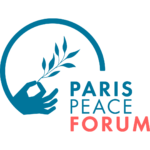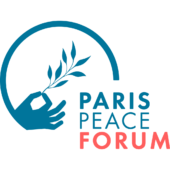Peace, Geopolitics and Multilateralism

Thematic Events on 12 November 2024
The war in Ukraine has brought a new sense of urgency to the EU enlargement process. Since February 2022, the European Council opened accession negotiations with Ukraine, Moldova, as well as North Macedonia, Albania and Bosnia and Herzegovina. Now comes the hard part, as the stalled accession process in the Western Balkans illuminates only too well. We will discuss what the EU and the candidate countries can learn from these experiences and what impact the new momentum of the incoming Commission has on the enlargement process to the Western Balkans.
By invitation only.
On the occasion of the 7th edition of the Paris Peace Forum and the 8th anniversary of the signing of the Peace Agreement between the Government of Colombia and the former FARC-EP guerrilla in November 2016, this event aims to combine reflections on justice and reconciliation, with a strong representation of Colombian cultural roots, particularly in relation to coffee and cacao, as a means of social transformation.
The objective of this event is to raise international awareness of the progress and results of the implementation of the Peace Agreement signed in 2016, both in terms of reintegration and transitional justice, and to contribute to the non-stigmatization of the signatories.
Specific objectives:
- Strengthen the international perception of the results of the implementation of the 2016 Peace Agreement and the commitment of both High Contracting Parties to a comprehensive implementation.
- Highlight the productive projects of the 2016 Peace Agreement around Colombia’s emblematic products: coffee and cacao.
- Share experiences and best practices developed by Colombia in the field of transitional justice and reconciliation, particularly the reparative dimension of specific sanctions: work, reparative actions, and activities (TOAR).
- Contribute to international discussions on mechanisms and proposals aimed at structuring reconstruction and reconciliation processes, enabling the consolidation of overcoming global conflicts.
- Contribute to discussions on how to rebuild once ceasefires are reached in various conflicts around the world.
By invitation only.
In an increasingly fragmented and complex international context, it is essential to explore the future of the European Union’s (EU) foreign policy. Facing global challenges such as armed conflicts, economic crises, climate change, and the rise of populism, the EU must reassess its role and strategies on the international stage. This reflection is part of the quest for a functional new world order capable of addressing contemporary and future issues (peace, geopolitics, and multilateralism).
Current conflicts have a profound impact on international relations and power dynamics, exacerbating issues such as migration crises, energy security, and threats to regional stability. In this context, the EU faces major challenges that require urgent attention. The conference will examine the ideals and values that should support this new global architecture, as well as emerging trends and future challenges awaiting the EU’s foreign policy. A proactive and adaptable approach will be necessary to navigate an ever-evolving world. It will also be important to develop recommendations for implementing a coherent and resilient foreign policy strategy within the framework of the newly renewed European Commission.
Key Questions to Address:
- What new forms of cooperation could the European Union develop with diverse actors such as institutions, regions, and states?
- Advanced technologies, particularly artificial intelligence (AI), play a central role in current geopolitical dynamics. What are the implications for security, the economy, and human rights, and how can the EU adopt an ethical and regulated approach to ensure the responsible use of AI while strengthening its position as a global player in the technological field?
- How can the EU continue to promote human rights and its core values on the international stage?
- Recent reports from Enrico Letta and Mario Draghi emphasize the importance of a more integrated financial system to enable the EU to tackle challenges, including financing the energy transition. What are the prospects for implementing these recommendations in terms of institutional feasibility and political will?
- How could a Capital Markets Union help finance the energy transition? Is this a priority topic for the new Commission? What is the view on the renewed proposal by the European Investment Bank and Spain to advance this issue through a coalition of willing small countries?
- In the face of divisive topics among member states, can coalitions of willing countries be a sustainable solution? What is the relevance of the treaty reform proposals put forward by the Franco-German working group published in September 2023?
- The EU has developed a regulatory approach to integrate environmental issues into all its economic and trade policies. While these regulations are essential to encourage sustainable practices, do they risk hindering the competitiveness of European companies? What environmental policy should the EU adopt in light of future crises?
Location: Maison de l’Amérique Latine (Salle Brasilia), 217 Boulevard Saint-Germain, 75007 Paris
By invitation only.
Youth involvement in peacebuilding and maintenance efforts is now viewed as an essential component of global stability. Not only do young people actively participate in these processes, but they are often the main catalysts. Their energy, creativity, and innovative approaches allow them to play a crucial role in developing dialogues and reconciliation processes. These qualities make them key players in advancing policies and influencing decisions at both local and international levels.
Theme of the Conference: “Youth as Pillars of a New World Order: Building and Preserving Peace in Times of Crisis” In the context of international conflicts, young people do not merely observe; they mobilizetheir communities, advocate for peaceful solutions, and raise awareness of the human and social impact of wars. Through their actions, they embody a collective voice that advocates for sustainable change. Looking to the future, it is clear that the influence of youth movements will continue to grow, as their demands for justice, equality, and sustainable development resonate with societal changes on a global scale. However, one question remains: how will today’s youth’s energy and activism shape tomorrow’s policies? Will their voices truly be heard at the highest political and diplomatic decision-making levels? Can young people genuinely be the force for change that the world needs to build a more equitable and peaceful future? This is precisely the objective of our conference: to explore how youth can and must play this decisive role in shaping the future, as they should have a place in a functional new world order.
Location: Mairie du 9e arrondissement, Salle Rossini, 6 rue Drouot, 75009 Paris
This international meeting will be an opportunity to hold constructive discussions between our two countries for which commitment to the fight against anti-Semitism is essential, both domestically and in a more global perspective.
By invitation only.


